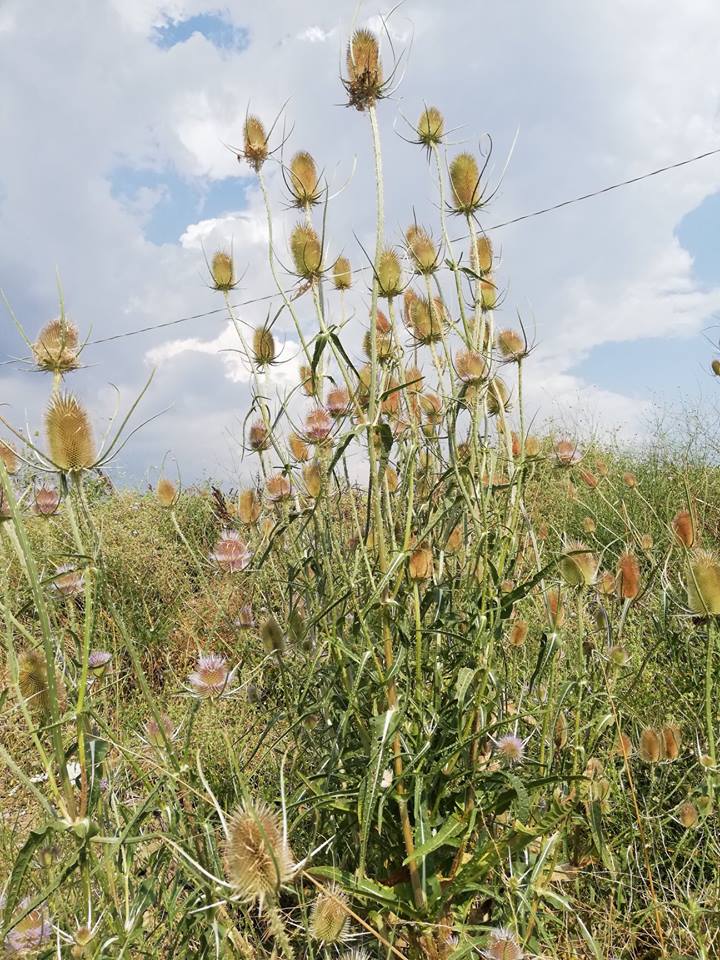
In the past, teasel (Dipsacus fullonum L.) was a greatly esteemed plant, while nowadays it is quite completely forgotten. Since the Ancient Egyptians times, its infructescences were used in wool carding. Unlike plastic and steel tools, the teasel allows a “finer” processing of the wool and prevents its fibers being broken. Human selection over the centuries, aimed at obtaining more uniform and compact heads (so more suited to wool carding), has brought to the
appearance of Dipsacus sativus (L.) Honck., once cultivated and now practically almost disappeared (except in Northern Italy). [Acta]
Different species of Dipsacus exist, of which D. fullonum L. is probably the most known. D. asperoides C. Y. Cheng et T. M. Ai and D. japonicus Miq. are present in Eastern Asia; their roots are used in Chinese Medicine, collectively called Xu Duan (that means something like “restore what is broken”).
Due to the thorns that cover the whole plant, teasel should be assigned to Mars dominion, but Culpeper tells us the plant is under Venus instead (in fact, it has some important venusian characteristics that coexist with more apparent martial ones).
As for the medicinal properties, the root is the part most often used, even though, according to some authors, the leaves have similar properties. The root is diuretic, sudorific, and stimulates bile secretion; it has cleansing and digestive properties. It has been traditionally used for gout, arthritis, tuberculosis, rheumatism, dropsy, hepatitis and for gallbladder ailments. Recently it has been used as a powerful remedy for Lyme disease. Like other plants in the ex-Dipsacaceae family (now included in Caprifoliaceae), it has been traditionally used for skin ailments like dermatitits, forunculosis, acne and psoriasis, especially when derived from digestive tract disfunctions. The plant can also be used as a salve for anus fistulae and hemorrhoids.
One of the moist prominent uses is for patients who are completely or partially debilitated from inflammation and breakdown of the joints and muscles, tipically people who can’t stand upright literally (also because they have lost their strength). It’s also indicated for broken bones and osteoporosis.
According to Hildegard of Bingen, the teasel has a dry and warm quality and a detoxifying effect; for this reason, powdered and taken in food or beverage, it drives poisons out from the body.
Leonhart Fuchs, in his “New Herbal Book” (1543) wrote:
“The water found in between the leaves is considered helpful for unclear eyes when they are washed with it. This water will also get rid of spots below the eyes, when they are washed with it.” Also Culpeper tells that “The water of the venus basin eases inflamed eyes.” (Venus basin indicates the water reservoir formed by the leaves toward the stalk). [Storl, Wood]
The plant is kind of a semi-carnivorous one: the water that pools in the leaf bases (“Venus basin”) tends to trap insects and their decomposing bodies stimulate the seed production. [Shaw]
In Traditional Chinese medicine, the Dipsacus root (Xu Duan) is considered an herb that tonifies the Yang. It is bitter, sweet and acrid and its nature is slightly warm.
It enters the Liver and Kidney channels, and is used to: supplement the Liver and Kidneys, stop bleeding and quiet the foetus (that is, in case of threatened abortion), strengthen the sinews and bones, treat injuries and join fractures. It is indicated for pain in the lumbar region, weakness of the legs, uterine bleeding and vaginal discharge, knocks and falls, and abscesses and sores.
The charred herb is used for uterine bleeding, mix-fried in brine for supplementing the Liver and the Kidneys, mix-fried in alcohol for stopping bleeding and treating injuries.
It can be used for impotence, seminal emission, spermatorrhea, enuresis and frequent urination due to Kidney Yang deficiency, even if these symptoms are not its first indications (in those cases, Xu Duan can be used as an auxiliary herb).
Being not greasy/clogging, it tonifies without causing stagnation.
Common dosage: 10-12g.
Precautions and contraindications: Xu Duan should not ne used in the initial stage of the dysentery, and is forbidden for depression due to anger.
Teasel is a plant that helps us to restore what is broken, gives us back the resources we need to lift up again, both physically and emotionally, and helps us to rebuild our armour. It pampers us, lifts us up and provides us with renewed strength, making us able again to perceive beauty.
References:
[Acta] http://
[Li Wei] Xu Li, Wang Wei, “Chinese Materia Medica – Combinations and Applications“, Donica Publishing
[Storl] Wolf D. Storl, “Healing Lyme Disease Naturally“, North Atlantic Books
[Shaw] Shaw, Shackleton, “Carnivory in the Teasel Dipsacus fullonum — The Effect of Experimental Feeding on Growth and Seed Set“, doi:10.1371/
[Wood] Matthew Wood, “The Earthwise Herbal – A Complete Guide to Old World Medicinal Plants“, North Atlantic Books (2008)




Fascinato